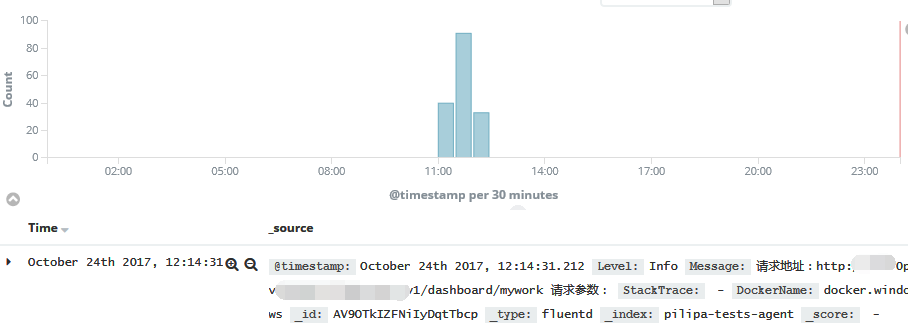经验与实践
前两篇文章里我们介绍了nxlog的日志收集和转发《ELK系列~Nxlog日志收集加转发(解决log4日志换行导致json转换失败问题)》,今天我们主要总结一下,在与log4和fluentd及elasticsearch配合工作时需要注意的几个点,这几个点也是我们经常遇到的坑,希望可以帮到大家!我们从日志产生端log4开始说。
- log4需要注意的,编码与时间戳格式
- nxlog需要注意output里对内容处理
- fluentd需要注意类型和format的规定
1 log4产生日志,格式必须是utf-8,ansi编码对中文解析时有问题,主要表示在fluentd到elasticsearch写数据时
<datePattern value="yyyyMMdd"Error.log"" />
<encoding value="utf-8" /> <layout type="log4net.Layout.PatternLayout"> </layout> </appender>
2 log4日志里,时间戳@timestamp,需要是UTC时间,格式为yyyy-MM-ddTHH:mm:ss.fff+0800
private static string FormatStr(string level, string message, Exception ex) { var json = JsonConvert.SerializeObject(new { target_index = projectName, timestamp = DateTime.Now.ToUniversalTime().ToString("yyyy-MM-ddTHH:mm:ss.fff+0800"), Level = level.ToString(), Message = message, StackTrace = ex?.StackTrace }); json = json.Replace("target_index", "@target_index").Replace("timestamp", "@timestamp"); return json; }
3 nxlog日志收集时,由于log4产生的数据都是 符号,所以在nxlog.conf里需要对output进行过滤,当然 ,使它变成两条消息,这样主体消息里就没有 了,json解析时就不会有问题
<Output out> Module om_tcp Host 192.168.200.214 Port 24224 Exec $raw_event =$raw_event + " "; </Output>
4 fluentd的配置里,类型需要是tcp,格式format需要是none
<source> @type tcp tag windows.log format none port 24224 bind 0.0.0.0 </source> <filter docker.**> type parser format json time_format %Y-%m-%dT%H:%M:%S.%L%Z key_name log reserve_data true </filter> <match **> @type stdout </match>
5 最后就是成功写入elasticsearch,通过kibana就可以查看日志了

请把学习作为一种习惯!
请把积累和总结变成一种学习的方式!
感谢各位的阅读!